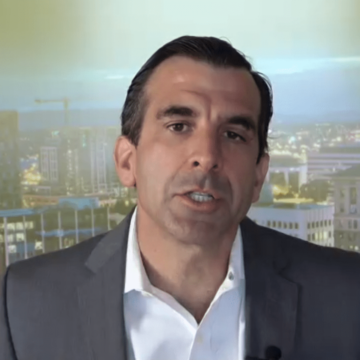San Jose Mayor Sam Liccardo says it’s time to stop blaming tech companies for the Bay Area’s problems.
In a recent question-and-answer session with Jim Wunderman, president of the Bay Area Council, Liccardo opined that Bay Area companies and workers are leaving because of mistakes made by local policy makers.
“(Tech companies) are a little frustrated folks discovered all these problems (with the Bay Area) and decided that tech should be to blame for all of them,” Liccardo said. “It’s natural for a lot of employers to say ‘We want to go somewhere where people actually want us, and they’re willing to engage with us before they decide to pass the newest regulation or taxes.’”
Wunderman said the Bay Area Council, an influential business association based in San Francisco, hears this complaint a lot.
The Bay Area Council invited Liccardo to speak on the Bay Area exodus after he published an opinion piece on the topic earlier this month in the San Francisco Chronicle.
In the piece, Liccardo lamented that the blame for the exodus of technology companies and their workers from the Bay Area has been placed squarely on the companies themselves. Liccardo argued blame should be shifted back to local policy makers.
Liccardo wrote “applause-seeking and responsibility-evading politicians” are the ones casting public blame off of themselves and toward tech for high housing costs.
“But finger-pointing obscures the fact that the Bay Area has become the nation’s most expensive place to build housing, at roughly $700,000 per apartment,” Liccardo wrote.
According to a 2019 survey from the UK-based firm Turner & Townsend, the Bay Area region is the most expensive place in the world to build a house, retail stores and medical facilities, at an average of $417 per square foot.
Yet, Liccardo himself has been a proponent of higher sales and property transfer taxes. He supported Measure B in 2016, which resulted in a 15-year quarter-cent sales tax in San Jose, as well as Measure E in 2020, creating a permanent property tax on transactions involving more than $2 million to fund affordable housing.
With the Bay Area Council, Liccardo elaborated on what he calls the “four L’s” that drive up construction costs, which are litigation, labor, land and local control.
“Our obsession with local control is killing us in the Bay Area,” Liccardo said.
For example, requiring trade union members to work on every project, regardless of size, Liccardo said, drives up costs. The same goes for lengthy and costly environmental reviews under the California Environmental Quality Act.
The conversation comes as San Jose considers the largest development project in its history — a massive campus for tech giant Google in its downtown core. Advocates worry the project will widen gentrification, exacerbate rents and displace working families.
The sprawling campus would include 7.3 million square feet of office space, as well as 4,000 housing units spread over 80 acres. But a report by Beacon Economics said that Google’s plans on the housing front, were not enough, and it would pass on to renters an additional average of $765 per month on rent — about $11,750 more in rent per year.
The campus is believed to bring some 20,000 jobs to the city.
[optin-monster slug=”yxup4h1fcich5uxtdvtn”]
Wunderman asked Liccardo what local tech companies could do to relieve their blame.
“I personally believe that tech is doing what tech should be doing, which is employing people and providing a great standard of living to a lot of families that depend on those paychecks,” Liccardo said. Silicon Valley companies are “innovating in a lot of ways, and particularly in a time like this in a pandemic, some of those innovations are pretty darn important.”
If there was one thing to improve, Liccardo said, it’s making real, impactful commitments in the community. A good example of that, he said, is Cisco Systems’ 2018 pledge of $50 million to help combat homelessness in the South Bay.
But other pledges have been more for show, Liccardo suggested, than an actual investment in the community — though he did not elaborate on what companies he’s referring to.
In December, Facebook pledged $1 billion to a community housing fund to provide more than 2,000 affordable housing units. Last March, Cupertino-based Apple committed to spend $2.5 billion on housing and homelessness in the Bay Area.
“I think people start to get suspicious of big announcements and they want to see more direct and continued engagement,” Liccardo said. “We see that (engagement) from many companies but it’s fair to say it’s not universal.”
A recent report from HSH.com, a market monitoring website for the housing industry, determined families need to earn $240,000 a year to buy a house in San Jose but about half of San Jose residents make only half that amount.
At the same time, Liccardo noted that important philanthropy tends to happen where a company’s headquarters are based, and the local economy loses sales taxes from a company’s move out of the area. San Jose can only continue to benefit, he said, if these companies think it’s worthwhile to stay.
The city notably lost two large technology company headquarters in the past several months — Hewlett Packard Enterprises and Align Technologies — to other nearby states.
“I’m certainly concerned about it for a few reasons,” Liccardo said, including losing sales tax revenue. “The moving of headquarters means that revenue is going to some other state. I can say that as the headquarters city of eBay, we benefit enormously from eBay being here in San Jose.”
There’s also a risk of losing top leadership talent in Silicon Valley.
Overall, Liccardo said, there are clouds gathering in San Jose, but “the sky isn’t falling.” If a few companies and their top leadership leave, he said that’s not as much of a problem unless future generations of talent start to follow.
“What is going to devastate our region is if the younger versions of Elon Musk … that are endeavoring to innovate in all kinds of different ways — if they don’t believe they can come to Silicon Valley and be successful, and be able to overcome the barriers to entry, then we are going to be in serious decline,” Liccardo said.
The chief executive of Tesla in December announced he’s moving to Texas, taking a jab at Silicon Valley’s difficult business climate.
Wunderman suggested the Bay Area Council might implement education on the value of having big tech companies in the region.
“I would hate to have them see us as not appreciating their participation in the region,” Wunderman said.
View Liccardo’s full discussion with the Bay Area Council here.





